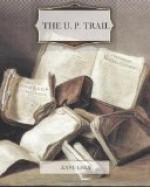This knowledge gave Neale a melancholy reminder of the dishonest aspect of the road-building. And he thought of many things. The spirit of the work was grand, the labor heroic, but, alas! side by side with these splendid and noble attributes stalked the specters of greed and gold and lust of blood and of death.
But neither knowledge such as this, nor peril from Indians, nor the toil-pangs of a galley slave had power to change Neale’s supreme state of joy.
He gazed back toward the east, and then with mighty swing he drove a spike. He loved Allie Lee beyond all conception, and next he loved the building of the railroad.
When such thoughts came he went back to pure sensations, the great, bold peaks looming dark, the winding, level road-bed, the smoky desert-land, reflecting heat, the completed track and gangs of moving men like bright ants in the sunlight, and the exhaust of the engines, the old song, “Drill, ye terriers, drill!” the ring and crash and thud and scrape of labor, the whistle of the seeping sand on the wind, the feel of the heavy sledge that he could wield as a toy, the throb of pulse, the smell of dust and sweat, the sense of his being there, his action, his solidarity, his physical brawn— once more manhood.
But at last human instincts encroached upon Neale’s superlative detachment from self. It seemed all of a sudden that he stepped toward an east-bound train. When he reached the coach something halted him—a thought—where was he going? The west-bound work-train was the one he wanted. He laughed, a little grimly. Certainly he had grown absentminded. And straightway he became thoughtful, in a different way. Not many moments of reflection were needed to assure him that he had moved toward the east-bound train with the instinctive idea of going to Allie Lee. The thing amazed him.
“But she—she’s gone out of my life,” he soliloquized. “And I am—I was glad!”
The lightning-swift shift to past tense enlightened Neale.
He went out to work. That work still loomed splendid to him, but it seemed not the same. He saw and felt the majesty of common free men, sweating and bleeding and groaning over toil comparable to the building of the Pyramids; he felt the best that had ever been in him quicken and broaden as he rubbed elbows with these simple, elemental toilers; with them he had gotten down to the level of truth. His old genius for achievement, the practical and scientific side of him, still thrilled with the battle of strong hands against the natural barriers of the desert. He saw the thousands of plodding, swearing, fighting, blaspheming, joking laborers on the field of action—saw the picture they made, red and bronzed and black, dust-begrimed; and how here with the ties and the rails and the road-bed was the heart of that epical turmoil. What approach could great and rich engineers and directors have made to that vast enterprise without these sons of brawn? Neale now saw what he had once dreamed, and that was the secret of his longing to get down to the earth with these men.




